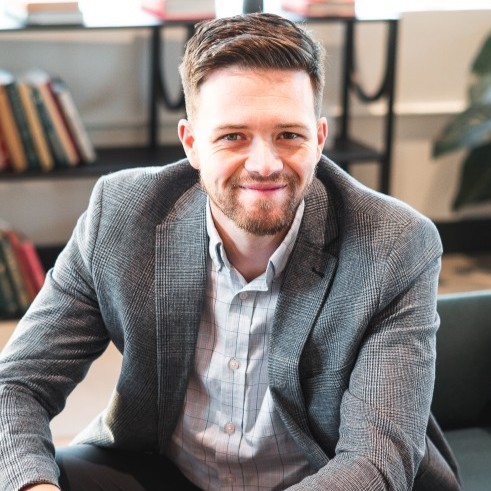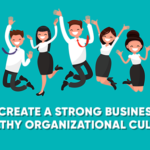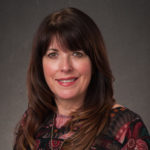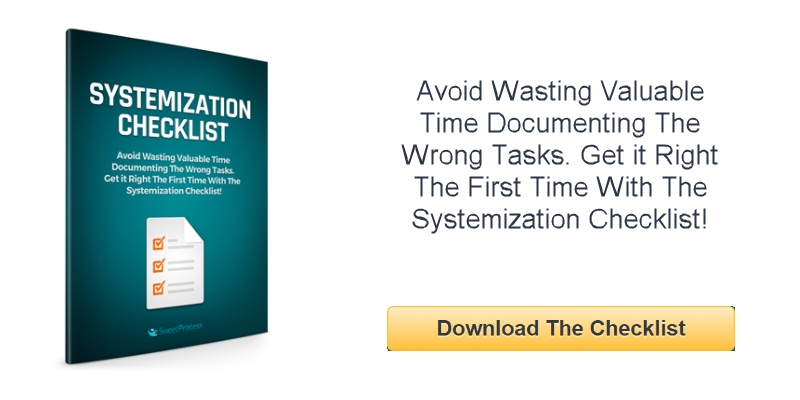Impact Business Sales by Simplifying Processes and Integrating Culture
Last Updated on March 8, 2024 by Owen McGab Enaohwo
Fresh perspective, new look, or external feedback on things is always good.
On this episode of the Process Breakdown Podcast, guest speaker Mr. Rhys Green and host John Corcoran discuss how looking with a fresh perspective can transform things.
They recapped Mr. Green’s time at various companies where, as the newcomer he often brought new insight and ways to simplify and streamline processes, and how improving work culture can improve productivity in business.
Listen to the audio interview
Discover more business success stories! Subscribe to our podcast
Key Resource List
- SweetProcess.com, 14-day free trial, no credit card required.
- Trail Blaze Partners
- LinkedIn Rhys Green
Show Notes
0:06 – Intro
0:28 – John Corcoran shares the best solution that makes documenting standard operating procedures drop-dead easy, highlighting a 14-day free trial. No credit card required.
1:28 – Mr. Corcoran introduces today’s guest, Rhys Green, co-founder and CEO of TrailBlaze Partners.
1:54 – Mr. Green introduces himself and talks about his company, TrailBlaze Partners, and explains the kinds of clients they work with.
3:17 – Mr. Green talks about his time working at 1-800-Got-Junk, what he learned and how it helped him.
5:14 – Mr. Green explains the processes that help people balance multiple roles in a business.
7:04 – Mr. Green explains how to build and maintain culture between workers despite limited interaction.
8:57 – Mr. Green talks about his role at the You Move Me franchise, how he unifies and applies one culture idea to various franchises.
10:22 – Mr. Green explains how he went about hiring the right people to work at 1-800-Got-Junk.
12:31 – Mr. Green explains how he simplified the complex tax of moving people.
14:38 – Mr. Green gives examples of some of his recent works with TrailBlaze Partners.
16:47 – Mr. Green talks about the value of, and what it’s like being, an outsider in a business with a fresh set of eyes to help question processes and provide perspective.
20:01 – Mr. Green lets us know where people can reach and connect with him online.
20:19 – Outro
Guest Profile

Rhys Green is the co-founder and CEO at TrailBlaze Partners in Vancouver, Canada.
He is experienced in helping businesses build a scalable foundation through optimizing people, measurement and processes.
He obtained an associate degree in business and events management from International College of Management, Sydney, and Master of Business Administration at the Edinburgh Business School, Heriot-Watt University.
His skills range from sales management, operations management, strategic planning, and coaching, to project management and public speaking.
Transcript of the interview:
Speaker 1: Welcome to the Process Breakdown Podcast, where we talk about streamlining and scaling operations of your company, getting rid of bottlenecks, and giving your employees all the information they need to be successful at their jobs. Now, let’s get started with the show.
John Corcoran: All right, John Corcoran here, co-host of the Process Breakdown Podcast, where we talk about the streamlining and scaling operations of your company, getting rid of bottlenecks and giving your staff everything they need to be successful at their jobs. Some of our past guests include David Allen of Getting Things Done and Michael Gerber of the E-Myth, and many more.
John Corcoran: And this episode is brought to you by SweetProcess. Have you ever had team members ask you the same questions over and over again and it is the 10th time you spend explaining it? Well, there’s a better way. There’s a solution. SweetProcess is a software that makes it drop dead easy to train and onboard new staff and save time with existing staff. Not only do universities, banks, hospitals, and software companies use them, but first responder government agencies use them in life or death situations to run their operations.
John Corcoran: You can use SweetProcess to document all the repetitive tasks that eat up your precious time so you can focus on growing your team and empowering them to do their best work. You can sign up for a free 14 day trial, no credit card required. Go to sweetprocess.com, sweet like candy, that’s S-W-E-E-T process.com.
John Corcoran: All right. So my guest here today is Rhys Green. He’s the co-founder and CEO of Trailblaze Partners out of Vancouver, Canada. And we’re going to be talking about how scale starts with culture and accelerates by simplifying. That’s the topic we’re going to focus on. But first, Rhys, I’ll turn it over to you and just tell us a little bit about who you are and what your company does. What types of clients do you work with?
Rhys Green: Hey, thanks, John. Appreciate you having me here, man. It’s a pleasure to be here and you nailed the name of our company there. So thanks for getting that one right. So, we predominantly work with companies who are really people heavy. So, retail, home services, trades, hospitality, those types of industries, where you’ve got a lot of frontline people talking directly to customers. And because they’re business is people their number one problem tends also to be people. So that’s the kind of stuff that we work on with them is helping them to engage their people, build a culture that is both caring and high-performance and delivers the results that they need ultimately.
John Corcoran: It’s interesting to put that effort on culture and then that’s going to help with the operations and systematizing and all that. So, I want to dive into that. Now you cut your teeth at 1-800-GOT-JUNK?, which is a famous business story. They went from a couple of million dollars in revenue to over a hundred million dollars in revenue in, I think I want to say a four or five year period or something like that. And way beyond it, after that. What was that experience like working at 1-800-GOT-JUNK? What did you learn from that experience, where you’re working with people who are out in the field, going out in trucks, picking up junk and moving it?
Rhys Green: Yeah, that was a great ride. I feel really lucky to have had the time at 1-800-GOT-JUNK?, and actually 02E brands, which have a couple of other brands under them now as well. I first moved to Canada in 2008, and I don’t know how well you remember 2008, but it was not a great time to be looking for work. Yeah, I moved here with 700 bucks in my pocket and no job and I had two job offers and one of them was not something I wanted to do at all. And then the other one was selling junk removal services over the phone to Australians for 1-800-GOT- JUNK?. I’d never heard of the company. I didn’t really know what a junk removal company did, but I then got-
John Corcoran: You had the right accent.
Rhys Green: Yeah, exactly. I had the right accent. That was probably why I got hired. But my then girlfriend, now wife, convinced me that the training was great at 1-800-GOT-JUNK?. She’d heard good things and so I took the job and I ended up spending the best part of 10 years with the organization and did a whole bunch of different roles from sales to sales leadership.
Rhys Green: I was the general manager for a couple of franchises in Australia. I was in Gold Coast for a few years. Led strategy and execution, call center operations, field operations. Nine titles in 10 years, a whole bunch of stuff. And it was a great ride. And now you say working with guys and girls in the field that were picking up junk and dirty stuff, well, I was one of those guys. The franchise that I ran was quite small at the time and so I remember some pretty gross jobs. But it’s certainly a fun gig.
John Corcoran: Now there’s a lot of companies, especially the larger companies that you have these regimented roles where people are in different silos doing different jobs. But in that situation you had people in the field who have to also do sales and they have to move junk. Is that how it worked? And how do you teach processes and systems for people that have to balance those different roles, and be good at both?
Rhys Green: Yeah, that’s right. I mean, it’s a tough role, the truck team member role. It’s someone you see out there very often. You nailed it in that it’s an on the road sales gig, and when you do a really good job selling it you get to pick up some gross stuff. Now its not always gross. The reward is not always gross stuff, sometimes it’s just a couch or an old mattress or something.
Rhys Green: But in terms of training and leadership for those types of roles, what we would look for is someone who’s a people person first. You always look for someone who could connect easily with the customer on site. And we figured the rest, the more technical side of the job we could teach and build systems and process around.
Rhys Green: For example, the pricing system is quite simple in 1-800-GOT-JUNK?. It’s [inaudible 00:06:03] of a truck and we would always make sure that they had a laminated price list in their hands. This is before tablets. But they’d have a laminated price list in their hand, so it was as easy to pick out. This is what it looks like. Here’s the size of stuff that we’ve got, and this is the price that it’s going to be.
Rhys Green: And even down to sorting stuff, again, you simplify. Making sure that you get the right metal in the right place. The metal, like copper or the stuff that’s worth a little bit more at the recycler, a magnet will stick to. And so we would just put a magnet in the pocket of all of our guys and you check the metal with a magnet and if it sticks, then you put it to the side. If it doesn’t, you put it up this side and you’re good to go. So it’s about simplifying and keeping the rules really easy to follow from a technical perspective.
John Corcoran: Now, you say scale starts with culture. How do you build culture where you’ve got a company where guys are in trucks offsite, not at a company headquarters, so they’re separate much of the time? How do you build a great culture with that type of context?
Rhys Green: Yeah, I think one of the keys to that is having a really strong onboarding process and making sure that as you’re going through interviews you’re looking for culture fit in terms of core values and all the things that we know make up culture. So it starts with the interview process, and then if you nail that onboarding, the first couple of days of onboarding where you’re explaining your values, this is how we live it. This is what it looks like to act in the [inaudible 00:07:29] area. This is how we make decisions. This is how we treat one another. And then holding really strictly accountable to that is super important. But I think setting that scene upfront and being really, really strong in the orientation.
Rhys Green: I think the other thing is for people who work… Everybody’s remote now. Almost everybody’s remote now, and there’s a lot of people who are in a remote environment for the first time. And when I first led in a remote environment one of the hardest lessons I learned was that when there’s smoke you should investigate immediately. When you’re in a local environment, if something goes a little bit wrong, you know someone pretty well, you can observe behavior fairly closely. And the investigation doesn’t have to be too deliberate.
Rhys Green: But when you see a little bit of a rumbling of something going wrong in a remote environment, you’ve got to take it very seriously and jump right in there and do a thorough investigation right away. And so I think being a little more tuned to the indicators that something might be a little awry culturally, the culture, if it’s not quite what you thought it was when someone was coming through interviewing, is another important tactic.
John Corcoran: Now, what about, so for another role you had, for three years you were Director of Operations for You Move Me, which has a franchise model for moving companies. Now, I imagine that was challenging as well. You have different franchises in different locations. How do you unify them? How do you apply one culture to all those different, very disparate companies?
Rhys Green: Yeah, well, 1-800-GOT-JUNK? was a franchise organization as well. And it comes back to core values, making sure that you’re picking those things up on the way in from franchisees. For You Move Me, the moving industry is a challenging business. I got to be a part of the startup of the You Move Me business as well. And we didn’t really have anybody in the business at the time that knew moving, and so we went out and just tried to figure it out.
Rhys Green: One of the things that struck me in the operations lead role there was just how many opportunities you have on every move to fuck it up. Excuse my language. And it’s a highly emotional process too. You’re going through somebody’s home. You’ve got hundreds, if not thousands of their items. When you put it like that, and you think about the stats, what are the odds that you’re going to break something or something’s going to go a little bit wrong?
John Corcoran: Especially compared to removing the-
Rhys Green: Something that someone-
John Corcoran: Especially compared to removing the junk that they don’t want, that they want you to just get rid of, versus their precious items that they want very carefully transported to the next location.
Rhys Green: It is so different. From the outside it looks the same. It’s two people in a truck in uniforms going to someone’s house to move some stuff around. But the actual delivery of the service and what it means to create a fantastic customer experience, it’s just so different.
John Corcoran: So how do you hire different? How did you find different people to perform those roles?
Rhys Green: Yeah, that’s such a great question. In 1-800-GOT-JUNK? we looked for people who were, like I said, customer-oriented. There’s a lot of change. You do 8 to 10 jobs a day in 1-800-GOT-JUNK?, so there’s a lot of windshield time. And it’s like a treasure hunt, you never know what you’re going to find. You don’t know what the next customer brings.
Rhys Green: In Move, you’ve got one job, maybe two in a really busy day. And so you’re looking for people who are a lot more patient, a lot more detail-oriented. And often those things don’t come along with people orientation, and so we had to build more systems around how do you make a customer happy? How do you connect with the customer rather than the technical orientation on that one? So a lot of the training and orientation work was very different in the moving business than the junk business.
John Corcoran: Did it evolve a lot from the beginning in terms of the questions that you asked or the types of qualities you looked for when you were hiring?
Rhys Green: Yeah, it really did. Especially because most of the people involved in the moving business when we first launched were 1-800-GOT-JUNK? people. We launched with a bunch of 1-800-GOT-JUNK? franchisees. And I was coming from a junk background and so were a few of the other people involved in the launch. And so we made a ton of assumptions that just turned out to be wrong. And we had to really quickly, or as quickly as we could iterate.
Rhys Green: I think we probably could have done it quicker in retrospect, but we had to really quickly iterate the process and figure out which of the assumptions was going to fit and which of them wasn’t going to fit. And we definitely made some mistakes along the way. I dealt with some pretty, pretty serious escalations from customers.
John Corcoran: I would imagine. Yeah. And talk about that with, you mentioned that moving people is a complex thing. There’s a lot of different parts. There could be thousands of different pieces. It could take a day or more to move everything. I think of a moving person in a truck putting a jigsaw puzzle together to fit everything in there. Plus the emotions you have to deal with. But you say that scale starts with culture and accelerates by simplifying. So how did you simplify that complex task of moving people?
Rhys Green: Yeah, again, such a great question. I’m also a franchisee for You Move Me, and have been for six or seven years. And so I’d actually point at my managing partner, Patrick Ellison, he figured out a lot of the simplification stuff along the way. But for us it was about making sure we had the right tools, making sure that in the morning everything was set up, ready to go, the right stuff was on the truck.
Rhys Green: It was not necessarily about making the process of packing a truck more simple than any other. Although we switched from cardboard cartons to plastic boxes, to the reusable plastic boxes. And aside from being better for the environment that has made packing the truck easier because it’s more consistent, the size of the [crosstalk 00:13:21].
John Corcoran: Oh, interesting.
Rhys Green: Yeah.
John Corcoran: I haven’t seen that before.
Rhys Green: Yeah. We just happened to cross that…
John Corcoran: That’s like changing the way that the moving industry has been done for decades.
Rhys Green: Yeah. I don’t know. There’s other guys out there doing that, other guys and girls out there doing that. So I wouldn’t claim that it’s our innovation, we just got lucky to stumble across it.
Rhys Green: But what I think we’ve done really well and where we’ve innovated on the process, like I said, it was simplification of the customer-facing stuff, where we give our customers a plant at the end of the move to say thank you, as a housewarming gift. And you don’t have to be particularly people-oriented to walk up to a customer and say, "Hey, thanks for having me in your home. Here’s a really nice gift. We really appreciate your time." There’s not a lot of charm or anything required to go and do that.
Rhys Green: And so, the systematization on that business was really more around the customer-facing stuff than actually how do we lift and load and put things in the truck.
John Corcoran: So talk about some of the clients that you’ve worked with more recently and ways in which you’ve taken these ideas that we’re talking about, putting a good culture in place, simplifying some of… Give me some more examples of the more recent work that you’ve done with Trailblaze Partners.
Rhys Green: Yeah, sure. One of my favorite clients, and I haven’t asked his permission to share details of [crosstalk 00:14:45].
John Corcoran: We won’t reveal who it was then.
Rhys Green: Yeah. He’s a great guy and you’ll know who I’m talking about when I get into the story. But when I first joined the organization and started doing some project work with them, we started to look at their call center process. And the actual service delivery in that business is highly technical and high-risk because there’s a lot of liability. If they get it wrong there’s a good chance of death or injury to the homeowner. And so the technical side of the business, you really don’t want to mess with.
Rhys Green: But on the customer facing side, they were making that process really complicated. They were asking the customer a lot of detailed questions about what was in their home, what the problem was, using technical jargon. I still don’t understand most of the jargon that they were using to begin with. And so where we really focused was on simplifying that customer-facing process and taking the technical stuff that we were doing and just putting it in the backend.
Rhys Green: And what we did was we took what was a many, many question discovery process in the initial sales call, we turned that into three questions just to identify what type of inspection they need first, and then get somebody out on site. And the less information has an impact of the operations one bit, but the less arduous task of explaining what this person has in their home has certainly impacted the customer. And it’s made hiring and training and all of the other parts that go into a call center much easier.
John Corcoran: Interesting. And how valuable is it for someone like yourself to come in as an outsider with a fresh set of eyes to a business and look at the way that the operations are run and be able to say, "Why are you doing it this way? Why is it so complicated here? Why is it taking so long?" How helpful is that fresh set of eyes?
Rhys Green: Yeah. I have a vested interest in saying very helpful.
John Corcoran: I figured you’d say that.
Rhys Green: Yeah. I’ll tell you a quick story. So obviously, 10 years in one company and I love solving problems and I never really understood the value of consultants, but it looked like fun. It looked like fun going into other people’s companies and helping them solve their problems. And so when I decided to leave and do my thing, consulting was the path that looked like the right one for me.
Rhys Green: And so, I started to get into it still not fully understanding what the value was. And now that I’ve done it and been in 25, 30 odd companies over the last few years, and I cannot overstate how valuable it is to have fresh eyes. It’s so easy to get bogged down in the weeds, particularly as an operations person, you’re living in step-by-step process. And for the record, my background is in operations. It’s operations in service businesses, but operations more than anything.
Rhys Green: And I just didn’t appreciate how difficult it is to pull yourself up out of those weeds and see a process freshly for the first time and how easily… It’s just asking those dumb questions. Going back to that example that I just shared, that whole process started out because we were sitting in one of their weekly team meetings and I just said, "Hey guys, is there any reason that we do it this way?" And they all looked at each other and went, "I don’t know. I don’t think so." So then we started digging deeper into it and realized there was no real reason for it to be done that way, and so we were able to start simplifying.
Rhys Green: And it’s not just the fresh eyes, it’s when you’ve got the organizational history in your head as well. And you were there and you made that decision. And at the time you made that decision to do this thing that way based on the best information you had at hand, and now the information’s changed and you maybe haven’t recognized all those changes because it’s really tough to see them. So, I think for a lot of reasons it’s very valuable to have those fresh eyes on it.
John Corcoran: Right. And in addition, there may be political history to it, someone fought some battle and they conceded and this person won on this piece, and they had ownership over this piece and that’s why everyone’s gone along with it. So I imagine it’s helpful also to have just an outsider, someone who’s not been with the company for a while, can come in and who can make those types of observations.
Rhys Green: Yeah, absolutely. We sometimes get brought it into organizations just to be the bad guy. The change is known, the change that’s needed is known and we get brought in just to help rattle the cage and push people forward to see that the change needs to happen. Sometimes there’s more credibility to an outside voice than an inside voice.
Rhys Green: And to your point, politics plays a part. There’s a whole bunch of different influences. And we always go in with the assumption that the clients we’re working with are smart people and they’ve tried their best. And they’ve made the very best decisions that they can with the information that they had at the time. And we just try to look at things from a slightly different perspective. And there’s definitely value in that.
John Corcoran: Rhys Green, co-founder and CEO of Trailblaze Partners. Where can people go to connect with you or to learn more about what you do?
Rhys Green: Yeah. Set to trailblazepartners.com or follow me on LinkedIn, Rhys, R-H-Y-S, Green is the last name just like the color. You’ll be able to find me on there. And I’m posting pretty regularly about these types of topics so I’d love to have you on there.
John Corcoran: Great. All right. Thanks so much, Rhys.
Rhys Green: John, thanks for having me, man.
Speaker 1: Thanks for listening to the Process Breakdown Podcast. Before you go, a quick question. Do you want a tool that makes it easy to document processes, procedures, and/or policies for your company so that your employees have all the information they need to be successful at their job? If yes, sign up for a free 14 day trial of SweetProcess. No credit card is required to sign up. Go to sweetprocess.com, sweet like candy and process like process, dot com. Go now to sweetprocess.com and sign up for your risk free 14 day trial.
Owen: Hi, this is Owen, the CEO and co-founder here at SweetProcess. If you’ve enjoyed listening to this podcast interview, actually, you know what I want you to do? Go ahead and leave us a five star review on iTunes. That way we get more people aware of the good stuff that you get here on this podcast. Again, go on to iTunes and leave us a five star review. Looking forward to reading your review. Have a good day.











Leave a Reply